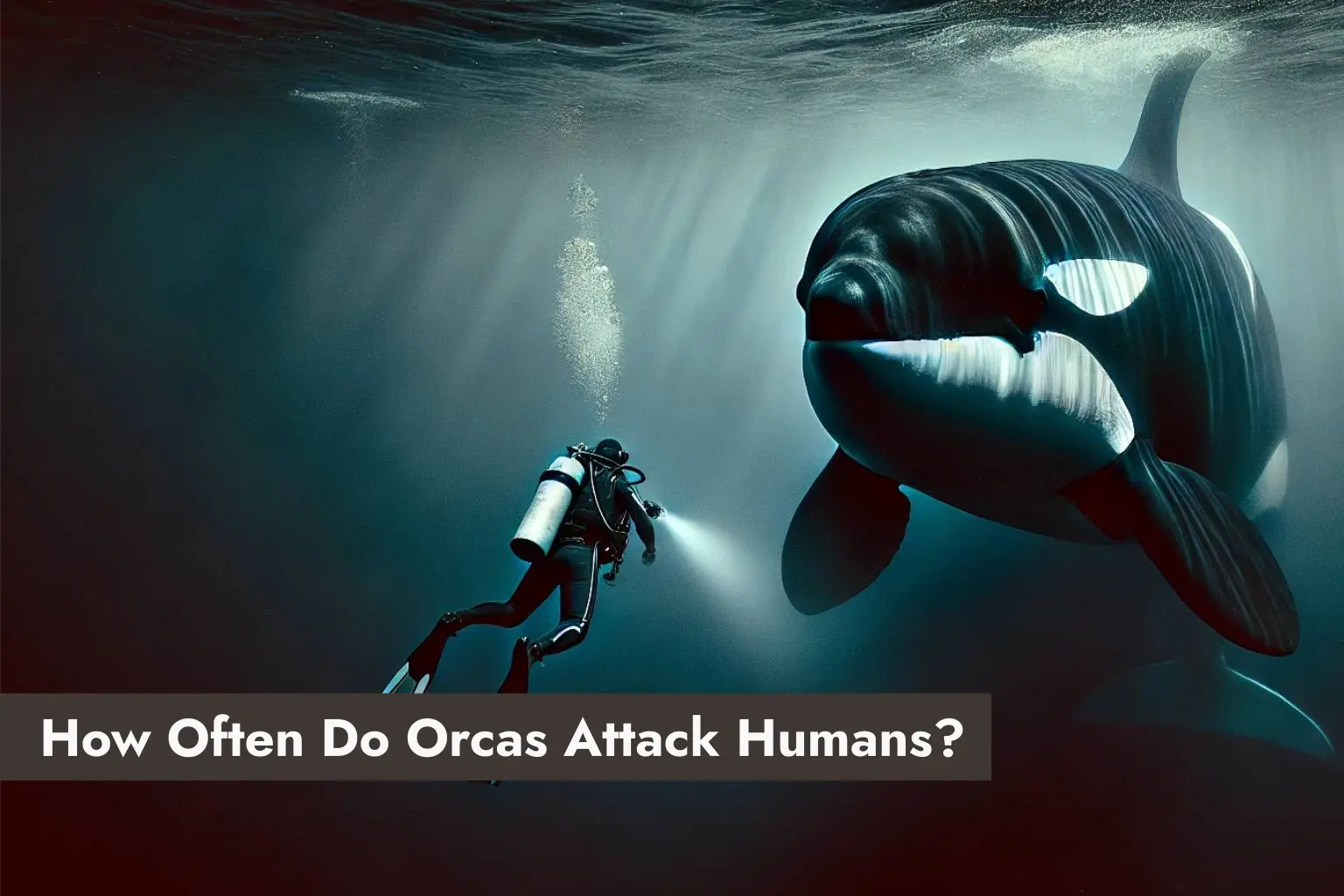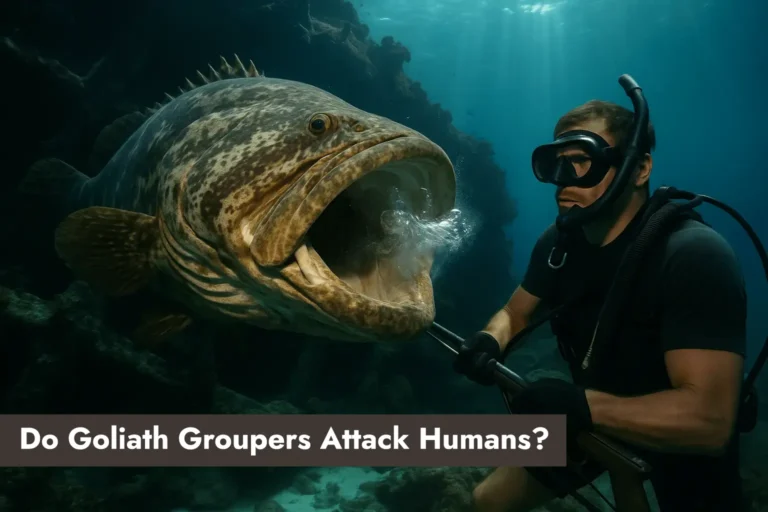How often Do Orcas Attack Humans?
Orcas, commonly referred to as killer whales, are among the most intelligent and powerful predators in the ocean. Their striking black-and-white appearance and highly social behavior have fascinated humans for centuries. However, a common question that arises is: do orcas attack humans?
Unlike sharks, orcas are not known to view humans as prey. In the wild, there are no confirmed fatal attacks by orcas on humans, which sets them apart from other large marine predators. However, incidents involving captive orcas and recent reports of orcas attacking boats have raised curiosity and concern.
Should we fear these magnificent creatures, or is their reputation misunderstood? This article explores the truth about orca behavior, examines real-life encounters, and provides essential safety tips to help you understand when—if ever—killer whales attack humans. Additionally, it offers guidance on what to do in the event of an orca encounter.
Understanding Orcas: The Apex Predators of the Ocean
Orcas, also known as killer whales, are the ocean’s top predators, recognized for their intelligence, teamwork, and complex social behaviors. Despite their fierce reputation, they are not mindless killers; instead, they are highly strategic hunters equipped with unique communication skills.
Scientific Classification and Physical Traits
Orcas are the largest members of the dolphin family, growing up to 30 feet long and weighing over 10,000 pounds. They have powerful tails that enable them to swim at speeds of up to 35 mph. Their distinctive black-and-white markings aid in camouflage within the ocean.
Orca Intelligence and Social Behavior
Orcas live in close-knit pods, which are typically led by matriarchs, and their social bonds can last for a lifetime. They communicate and hunt using advanced vocalizations and echolocation. This intelligence leads many to question whether orcas attack humans, as they appear capable of distinguishing between threats and curiosity.
Diet and Hunting Techniques
Unlike sharks, orcas do not eat humans. Instead, they primarily prey on fish, seals, and even great white sharks. Each pod of orcas has specialized hunting techniques; some work together to create waves that wash seals off the ice, while others coordinate their attacks for greater effectiveness. Their remarkable ability to adapt makes them one of the most effective predators on Earth.


Do Orcas Attack Humans in the wild?
One of the most common questions people ask is whether orcas attack humans in the wild. The answer may surprise you: there are no confirmed cases of a wild orca killing a human. Unlike sharks, which sometimes mistake humans for prey, orcas seem to recognize that we are not part of their food chain.
Rare Historical Accounts of Orca Encounters
Although modern reports indicate that wild orca attacks on humans are exceedingly rare, one of the earliest recorded encounters occurred in 1911 in Antarctica. Photographer Herbert Ponting witnessed a group of orcas trying to tip over an ice floe where he and his sled dogs were standing. The whales might have mistaken the dogs for seals, which are their natural prey.
This event highlights that while killer whales rarely attack humans, they may sometimes approach out of curiosity or mistaken identity. However, Ponting and his crew were never harmed.
Inuit Oral History and Traditional Knowledge
Some Inuit oral histories from the 1950s recount an event in which a young man fell through thin ice and was allegedly taken by orcas. Although there is no official documentation of this incident, these stories add to the enduring mystery surrounding orcas’ behavior toward humans.
Indigenous communities that have coexisted with orcas for centuries regard them not as threats but as powerful and intelligent beings of the sea. This respect for orcas is supported by modern research, which indicates that wild orcas do not intentionally attack humans.
Why Don’t Orcas Attack Humans?
Orcas are highly intelligent animals known for their ability to differentiate between prey and non-prey. They hunt various creatures, including seals, fish, and even whales, but they have never shown a natural inclination to attack humans. Some researchers suggest that their strong social bonds and learned behaviors contribute to their perception of people, not as food.
Close Encounters with Orcas
There have been instances where orcas have approached swimmers, surfers, and kayakers, often out of curiosity. Some divers have even experienced playful interactions with them. Unlike the attacks by killer whales on humans in captivity, wild orcas typically maintain their distance or interact in a non-aggressive manner.
Rare Cases of Aggressive Behavior
Wild orcas rarely display hostility towards humans, but some incidents have been reported where they have “mouthed” divers or bumped into boats. However, these occurrences are more playful or accidental rather than actual attacks. Experts suggest that when orcas interact with humans, they are typically motivated by curiosity rather than aggression.
Although they are powerful predators, they seem uninterested in harming people. Their intelligence and social nature likely play a significant role in the unique relationship between humans and one of the ocean’s top hunters.
Expert Perspective: Why Don’t Orcas Attack Humans?
Marine biologist Erich Hoyt states that orcas possess the intelligence to distinguish between prey and non-prey. Unlike sharks, which hunt primarily based on instinct, orcas learn through experience and social interactions. This ability may help explain why attacks on humans by killer whales in the wild are extremely rare—they understand that humans do not belong to their natural diet.
Researchers suggest that orcas may engage in cultural learning, teaching younger members of their pod to avoid humans instead of hunting them. This advanced intelligence is one of the main reasons why attacks on humans by orcas are rarely a concern.
Captive Orcas and Attacks on Humans
Wild orcas typically do not attack humans, but this is not always true for orcas kept in captivity. In marine parks, there have been incidents of orca attacks on humans that often end tragically. These events raise important questions about the effects of confinement on these highly intelligent animals.
Do Killer Whales Attack Humans in Captivity More Often?
Yes, unlike their counterparts in the wild, captive orcas have attacked several trainers over the years. Experts believe these incidents are due to stress, boredom, and a lack of natural stimulation. These tragic events underscore the ethical concerns surrounding the captivity of orcas and the risks they pose to both the whales and their trainers.
Why Do Captive Orcas Attack?
In the wild, orcas swim up to 100 miles each day, hunt in coordinated groups, and have strong social structures. However, in captivity, they are confined to small tanks, separated from their families, and required to perform for entertainment. This confinement can cause significant stress and frustration, leading to unpredictable and aggressive behavior.
Notable Captive Orca Attacks
One of the most notable cases involved Tilikum, an orca at SeaWorld, who was responsible for three human fatalities. There have been other incidents where trainers were pulled underwater or bitten. These attacks are not typical behavior for wild orcas, highlighting how captivity can affect their behavior.
Recent Surge in Orca Behavior: Boat Attacks in the Wild
In recent years, there have been reports of orcas attacking boats, which have puzzled researchers and sailors alike. These incidents, especially off the coasts of Spain and Portugal, have raised concerns about whether killer whales pose a threat to humans or if these interactions are something entirely different.
What’s Happening with Orcas and Boats?
Reports indicate that more than 500 incidents of orcas attacking boats have been recorded since 2020, especially around the Iberian Peninsula. Although there have been no direct attacks on humans by orcas, these events have raised questions about why these intelligent animals are targeting boats.
Why Are Orcas Attacking Boats?
Scientists have several theories regarding orca behavior. Some believe that orcas are playing or teaching younger pod members how to interact with objects. Others suggest that past trauma—For example, there was an incident where a boat may have accidentally injured an orca.—could lead to learned responses.
Are Humans in Danger?
While these boat incidents are concerning, marine biologists generally believe that orcas are not deliberately targeting humans. Instead, they are reacting to negative experiences with boats. This behavior may be a result of cultural learning within specific pods. Nonetheless, damaging a vessel in open water can pose risks to humans. Experts advise sailors to avoid known orca hotspots and to minimize disruptions if approached by a pod.
This unusual behavior has raised questions about whether orcas attack humans, but so far, encounters stem more from curiosity or frustration rather than outright aggression.
Why Are Orcas Called ‘Killer Whales’?
Despite their ferocious name, orcas are not known for attacking humans in the wild. The term “killer whale” originates from their reputation as top marine predators capable of hunting large prey, including seals, sharks, and even other whales.
The Origin of the Name
Centuries ago, sailors observed orcas hunting and killing large whales, which led them to refer to them as “whale killers”. Over time, this name was reversed to “killer whale”, creating a perception of danger toward humans that doesn’t accurately reflect their behavior.
Are Killer Whales Actually Dangerous?
Orcas are powerful apex predators, but their intelligence and social behavior distinguish them from other animals. Unlike sharks, orca attacks on humans in the wild are very rare, and most encounters are non-aggressive. This contrast between their fearsome reputation and their actual behavior highlights how they are often misunderstood.
So, do orcas attack humans because they’re “killers”? The answer is no. Their hunting skills are directed at their natural prey, not at people.
Safety Tips: What to Do If You Encounter an Orca
Although orca attacks on humans in the wild are extremely rare, knowing how to handle an orca encounter can help ensure safety. Whether swimming, diving, or boating, staying calm and respecting these intelligent creatures is crucial.
- Stay still and avoid sudden movements. Orcas are curious but not aggressive toward humans.
- Do not attempt to touch or chase them, as this can provoke unwanted reactions.
- If an orca approaches, observe from a distance and allow it to move on naturally.
- If orcas come near, slow down or turn off your engine to avoid startling them.
- Never feed or attempt to lure an orca closer, as it disrupts their natural behavior.
- Be aware of areas where orca boat attacks have been reported, particularly in European waters.
- Do not panic or splash excessively, as this may intrigue orcas further.
- Avoid making loud noises since orcas rely on sound for communication.
- Never harass or provoke an orca. While attacks on humans are a rare concern, reckless behavior increases risks.
Respecting orcas and maintaining a safe distance ensures that both humans and these magnificent creatures can coexist peacefully.
Myth-Busting: Separating Fact from Fiction
Orcas have long been misunderstood, with myths fueling fears about their behavior. Many wonder whether orcas attack humans or if their reputation is exaggerated. Let’s separate fact from fiction.
Myth: Orcas are bloodthirsty killers.
Reality: Despite their name, killer whale attacks on humans in the wild are virtually nonexistent. They are intelligent and social predators, not mindless attackers.
Myth: Orcas hunt humans like sharks do.
Reality: Unlike sharks, orcas do not eat humans. Their diet consists of fish, seals, and even whales, but there is no evidence that they view humans as prey.
Myth: Boat attacks mean orcas are turning against humans.
Reality: While there have been reports of orcas attacking boats, experts believe this behavior is playful or learned rather than aggressive. There have been no direct human attacks.
Understanding the truth about orcas helps us respect them as the ocean’s top predators without unnecessary fear.
Conclusion: Should We Fear Orcas?
So, do orcas attack humans? Evidence suggests they do not—at least not in the wild. Unlike sharks or other predators, orcas exhibit unusual aggression toward people and have never been recorded as killing a human in their natural habitat.
Although attacks on humans in captivity and recent incidents involving orcas and boats have raised concerns, these episodes do not represent their typical behavior. Their intelligence and strong social bonds distinguish them from apex predators.
Rather than fearing orcas, we should learn to respect them. Whether you’re a swimmer, diver, or sailor, understanding their behavior and following safety guidelines can foster peaceful coexistence. These magnificent creatures deserve admiration, not fear. Instead of questioning whether orcas attack humans, we should ask: How can we better respect and protect these intelligent beings before it’s too late?




